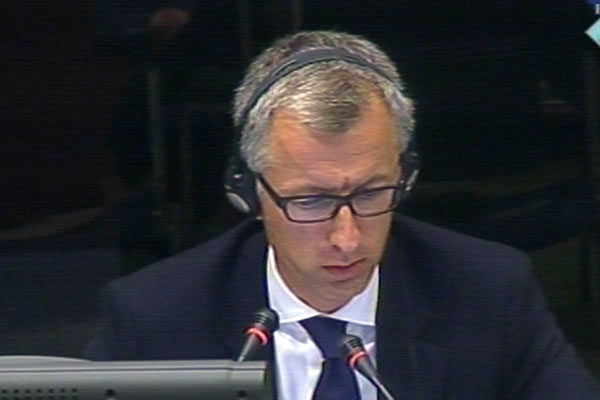Home
KARADZIC: WE WERE LENIENT
The accused Karadzic contested the claims made by the prosecution military expert that Karadzic’s orders contributed to the obstruction of the free movement of humanitarian convoys. Karadzic argued that he had far too many things to do and he got involved in those issues only when asked to do so by the international community. According to Karadzic, the Serb side was ‘way too lenient’
 Reynaud Theunens, witness at the Radovan Karadzic trial
Reynaud Theunens, witness at the Radovan Karadzic trial Prosecution military witness Reynaud Theunens wrote in his expert report for the trial of Radovan Karadzic that the former Republika Srpska president issued orders during the war which contributed to the obstruction of the free movement of convoys and the delivery of humanitarian aid.
As he continued cross-examining Theunens, Karadzic argued that he ‘got involved’ in the issues related to the passage of convoys ‘only when I was asked to do so by the international community’. As Karadzic explained, he was overburdened with other concerns, taking care of ‘2,000 km of frontline, 225,000 soldiers, a million and a half hungry inhabitants and 61 municipalities with inept leaders’. At the same time, Karadzic took part in the negotiations and worked until ‘two or three a.m.’. Karadzic noted that in 1,200 days, as many as 20,000 airplanes landed at the Sarajevo airport, which was, as Karadzic insisted, in ‘the Serb territory’.
Karadzic claimed that the Serb side was ‘too lenient’, allowing the shipments of fuel, food and other commodities to pass through; this was to the detriment of the VRS. On the other hand, the Serb side ‘had the right not to feed’ the enemy army, Karadzic contended. The witness brought up documents which show that Karadzic’s interventions obstructed the movement of humanitarian convoys, saying that those restrictions were not linked to the security of the Serb army because even convoys carrying school supplies were not allowed to pass.
Karadzic tried to distance himself from the crimes committed by the Yellow Wasps unit, noting that the police arrested them on his orders after they ‘went rogue’. The witness noted that the Yellow Wasps were involved in the takeover of power in Zvornik ‘with the knowledge and permission’ of the Serb Crisis Staff. Theunens is aware that they were arrested at one point, but were released soon afterwards. New proceedings were instituted years after the war, the witness explained.
Karadzic spent a substantial amount of time in his cross-examination trying to prove that the Bosnian Serbs’ strategic goals were just a ‘platform’ for peace negotiations – from Cutilheiro’s Plan in 1992 to the Dayton agreement in 1995. The peace plans eventually verified the goals, Karadzic noted. He claimed that had those goals been ‘goals to be achieved through war’, the army would have known about them. Karadzic referred to General Manojlo Milovanovic’s evidence in the Popovic et al case. As he testified, at the beginning of the war he asked the leadership to define the goals of war: either to protect the Serb people from annihilation and to make sure that BH remained part of Yugoslavia, or to create their own state within BH.
The witness dismissed Karadzic’s claims that the strategic goals were merely starting points for political negotiations. According to the witness, the congruence between the goals and actions of the VRS couldn’t be ‘just a coincidence’. The witness reached this conclusion by comparing the goals with the nine directives issued by the Serb forces’ Supreme Command from May 1992 to October 1995.
The Trial Chamber granted Karadzic’s request for additional 40 minutes for the cross-examination of the prosecution military expert. Theunens will thus complete his evidence tomorrow.
